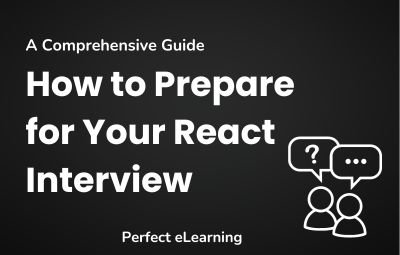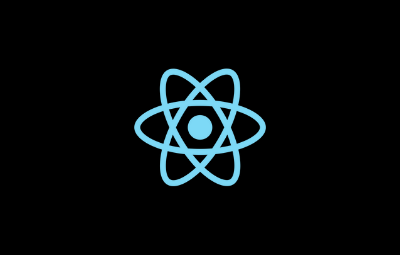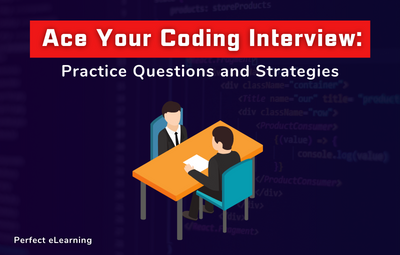

Ace your React interview with this comprehensive guide that covers everything you need to know, from mastering the basics to tackling challenging questions.
Embarking on a React interview can be both exciting and nerve-wracking. In today's tech-centric job market, mastering React is a crucial skill, making the interview process a pivotal moment in your career. Let's navigate this journey together, understanding the essentials that will set you apart.
1. The Significance of React Interviews
React, a JavaScript library for building user interfaces, has become a cornerstone in modern web development. As employers seek proficient React developers, interviews serve as the gateway to coveted opportunities. Navigating these interviews requires a comprehensive understanding of React fundamentals and the ability to showcase practical skills.
2. Understanding React Fundamentals
2.1 Overview of React
At its core, React is all about building reusable UI components. Understanding this fundamental concept forms the basis of any React interview. Let's delve into key concepts that interviewers often focus on.
3. Key Concepts Every Interviewee Should Know
3.1 Components and Props
Components are the building blocks of a React application. Knowing how to create and use them, along with understanding the role of props, demonstrates a solid foundation.
3.2 State and Lifecycle
State management is a crucial aspect of React development. Grasping the lifecycle methods and when to use them is vital for creating dynamic applications.
3.3 Handling Events
React applications are interactive, and event handling is a common task. Mastering this skill ensures you can create dynamic and responsive user interfaces.
4. Mastering React Components
4.1 Class Components vs. Functional Components
Understanding the difference between class and functional components is key. Each has its use cases, and knowing when to employ them showcases your expertise.
4.2 Props vs. State: Knowing the Difference
Props and state are integral parts of React. Distinguishing between them and utilizing them effectively contributes to writing clean and maintainable code.
5. State Management in React
5.1 The Role of State in React Applications
State plays a central role in React, impacting how components behave. Interviewers often explore your understanding of state and its influence on the user interface.
6. State Management Libraries: A Brief Overview
6.1 Redux
Redux is a popular state management library in the React ecosystem. Familiarity with its principles and usage can set you apart in interviews.
6.2 Context API
The Context API is another tool for managing state in React. Knowing when to use it showcases your ability to choose the right tools for the job.
7. Handling React Router
7.1 Navigating Between Components
Single-page applications often require navigation. Understanding React Router and how to implement dynamic routing is a skill that interviewers frequently assess.
8. React Hooks
8.1 Introduction to Hooks
Hooks revolutionized state management and side effects in functional components. An in-depth understanding of hooks, such as useState, useEffect, and useContext, demonstrates your adaptability to modern React practices.
9. Commonly Used Hooks in Interviews
9.1 useState
Managing state in functional components becomes seamless with useState. Interviewers may gauge your ability to use this hook effectively.
9.2 useEffect
Controlling side effects is crucial for application stability. Demonstrating proficiency with useEffect is often a point of focus.
10. Styling in React
10.1 CSS-in-JS vs. Traditional Styling
Choosing a styling approach is often a matter of preference, but understanding the pros and cons of CSS-in-JS versus traditional styling is essential.
10.2 Best Practices for Styling React Components
Consistent and well-organized styling contributes to the overall maintainability of your code. Interviewers may inquire about your approach to styling and best practices.
11. Testing React Applications
11.1 Importance of Testing in React Development
Robust applications require thorough testing. Emphasizing the significance of testing in your development process reflects a commitment to delivering quality code.
11.2 Tools and Libraries for Testing
Familiarity with testing tools and libraries, such as Jest and React Testing Library, can demonstrate your commitment to producing reliable code.
12. Optimizing React Performance
12.1 Identifying Performance Bottlenecks
React applications can face performance challenges. Knowing how to identify and address bottlenecks is crucial for creating efficient and responsive user interfaces.
12.2 Strategies for Optimizing React Applications
From code splitting to lazy loading, various strategies exist for optimizing React applications. Demonstrating your awareness of these strategies can impress interviewers.
13. Real-World Projects and Experience
13.1 Showcasing Personal Projects
Beyond theoretical knowledge, practical experience speaks volumes. Be prepared to discuss personal projects, highlighting the challenges faced and solutions implemented.
Conclusion
Interviewers often appreciate hearing about your problem-solving approach in real-world scenarios. Sharing experiences demonstrates your ability to apply knowledge to practical situations.
Frequently Asked Questions(FAQs)
Q1. What are the key concepts I should focus on when preparing for a React interview?
A1: Focus on understanding Reacts core principles like components, state management, lifecycle methods, JSX syntax, and handling events. Additionally, delve into related topics such as Redux for state management, React Router for navigation, and hooks for functional components.
Q2. How important is it to have practical experience with projects when preparing for a React interview?
A2: Practical experience with React projects is highly valued. It showcases your ability to apply theoretical knowledge to real-world scenarios, handle challenges, and implement best practices. Building projects helps in understanding Reacts nuances and strengthens problem-solving skills.
Q3. What resources or materials should I use to study for a React interview?
A3: Utilize a mix of official documentation, online courses (like those on Udemy, Coursera, or Pluralsight), YouTube tutorials, and books like "Learning React" by Alex Banks and Eve Porcello. Practicing on platforms like Code academy, Code Pen, or creating personal projects can solidify your understanding.
Q4. Are there specific problem-solving or coding challenges I should practice for a React interview?
A4: Yes, definitely. Practice coding challenges focusing on React-specific problems such as creating components, managing state, implementing conditional rendering, and understanding component lifecycle methods. Platforms like Leets Code, Hacker Rank, or Code Signal offer React-related challenges.
Perfect eLearning is a tech-enabled education platform that provides IT courses with 100% Internship and Placement support. Perfect eLearning provides both Online classes and Offline classes only in Faridabad.
It provides a wide range of courses in areas such as Artificial Intelligence, Cloud Computing, Data Science, Digital Marketing, Full Stack Web Development, Block Chain, Data Analytics, and Mobile Application Development. Perfect eLearning, with its cutting-edge technology and expert instructors from Adobe, Microsoft, PWC, Google, Amazon, Flipkart, Nestle and Info edge is the perfect place to start your IT education.
Perfect eLearning provides the training and support you need to succeed in today's fast-paced and constantly evolving tech industry, whether you're just starting out or looking to expand your skill set.
There's something here for everyone. Perfect eLearning provides the best online courses as well as complete internship and placement assistance.
Keep Learning, Keep Growing.
If you are confused and need Guidance over choosing the right programming language or right career in the tech industry, you can schedule a free counseling session with Perfect eLearning experts.


